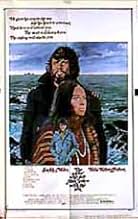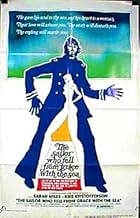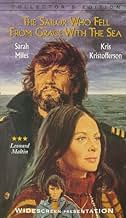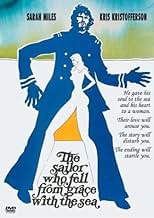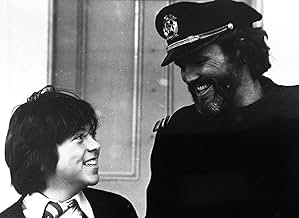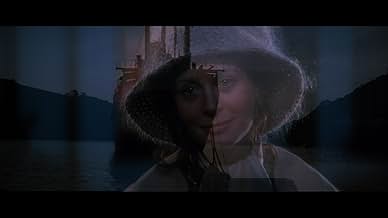I giorni impuri dello straniero
Titolo originale: The Sailor Who Fell from Grace with the Sea
VALUTAZIONE IMDb
6,2/10
1786
LA TUA VALUTAZIONE
Dopo la morte di suo padre, un ragazzo disturbato pianifica di vendicarsi il nuovo uomo nella vita di sua madre.Dopo la morte di suo padre, un ragazzo disturbato pianifica di vendicarsi il nuovo uomo nella vita di sua madre.Dopo la morte di suo padre, un ragazzo disturbato pianifica di vendicarsi il nuovo uomo nella vita di sua madre.
- Regia
- Sceneggiatura
- Star
- Premi
- 2 candidature totali
Charles Adey-Grey
- Man in Tea Room
- (non citato nei titoli originali)
Mabel Etherington
- Woman in Tea Room
- (non citato nei titoli originali)
Juba Kennerley
- Man in Tea Room
- (non citato nei titoli originali)
Recensioni in evidenza
An unforgettable and profoundly disturbing story centered on a widow, Anne, and her only son, Jonathan, in a remote English seaside town. Jonathan belongs to a gang led by a precociously intelligent sociopath known only as Chief, who through sheer force of will and intellect, indoctrinates them with a quasi-Neitzchean philosophy of ultimate superiority and the non-existence of morality. When Kris Kristofferson's Captain Jim arrives in town, and strikes up a passionate relationship with the lonely Anne, Jonathan sees him as a heroic masculine prototype, removed from society and living a 'true' life on the open sea. But when the Captain decides to settle down and marry Anne, Jonathan takes it as an ultimate and unforgivable betrayal, and exacts a terrible revenge.
Based on the 1963 Mishima novel, "The Sailor Who Fell From Grace With The Sea" hints at many themes, from Jonathan's Oedipal obsession with spying on his mother's bedroom to his physical admiration of the Captain that verges on latent homosexuality. The atmosphere, masterfully created by veteran cinematographer Douglas Slocombe, is one of darkly brooding clouds, gray seas, and an air that constantly threatens rain. The (in)famous sex scenes are really not that explicit, and the casual violence exhibited by the children is far more shocking than any glimpse of breast or buttock.
The film, for all its brilliantly evocative atmosphere, excellent performances, and quietly brooding menace, is not without its flaws. The score is terrible, all mawkish piano and sickly clarinet. It is often overly intrusive and distracts from the overall sense of ripe stillness that director Carlino conjures throughout the film. But in general, the film is a remarkable experience, and one that any viewer is unlikely to forget quickly.
Based on the 1963 Mishima novel, "The Sailor Who Fell From Grace With The Sea" hints at many themes, from Jonathan's Oedipal obsession with spying on his mother's bedroom to his physical admiration of the Captain that verges on latent homosexuality. The atmosphere, masterfully created by veteran cinematographer Douglas Slocombe, is one of darkly brooding clouds, gray seas, and an air that constantly threatens rain. The (in)famous sex scenes are really not that explicit, and the casual violence exhibited by the children is far more shocking than any glimpse of breast or buttock.
The film, for all its brilliantly evocative atmosphere, excellent performances, and quietly brooding menace, is not without its flaws. The score is terrible, all mawkish piano and sickly clarinet. It is often overly intrusive and distracts from the overall sense of ripe stillness that director Carlino conjures throughout the film. But in general, the film is a remarkable experience, and one that any viewer is unlikely to forget quickly.
The movie is indeed an adaptation of a novel by Yukio Mishima. Just to clarify, the novel is not an obscure work. Mishima is amongst Japan's most famous writers and was nominated for the Nobel Prize for Literature three times. Also, the plot of the original Japanese story does not happen in a remote fishing village; it happens in Yokohama, which is one of Japan's largest cities. Lastly, it does not happen in feudal Japan, a fact that would be very evident had someone read the book.
Now that that's been said, I've watched the movie since I very much enjoyed the novel. While I agree with most comments concerning the movie itself, I actually very much enjoyed the ending. Not only would have supplying an ending would have been taking too much liberty, but also it allows the viewer to imagine what would happen. Furthermore, to challenge another commenter, this sort of ending does work in movies and was a common motif of films during this era. Some other notable movies with endings similar to this include Francis Ford Coppola's "The Conversation" and "Parallax View."
Now that that's been said, I've watched the movie since I very much enjoyed the novel. While I agree with most comments concerning the movie itself, I actually very much enjoyed the ending. Not only would have supplying an ending would have been taking too much liberty, but also it allows the viewer to imagine what would happen. Furthermore, to challenge another commenter, this sort of ending does work in movies and was a common motif of films during this era. Some other notable movies with endings similar to this include Francis Ford Coppola's "The Conversation" and "Parallax View."
The script and direction meld into a strong movie. With charm and humor to spare, this film was among the top echelon of movies from 1976. The characters in this film have a lot of depth, and that makes all the difference. In the end, the audience gets a casserole of film elements and little of the satisfaction that comes from watching these types of movies. I guess if I was in a bad mood, this movie wouldn't be half as good, but I thought it to be enjoyable and would recommend it. This is a story about a place most people might not be able to conceive. It is a powerful film. Many scenes do not feel believable, but good performances help to enhance this story.
A spooky 'erotic' romantic thriller, with undertones and imagery of both THE INNOCENTS and LORD OF THE FLIES and even RYANS DAUGHTER this film had a bit of a notorious reputation in the late 70s because of the peephole sex scenes and the all too graphic mutilation of the family cat. Plenty of seniors went stampeding from the cinemas gasping especially after the cat got the chop, hissing and howling. The sight of Sarah Miles masturbating gave a us all a kooky preview to WHITE MISCHIEF made ten years later. There has been plenty of criticism about the translation of this Japanese novel into the foggy coast of Dover, but really it does not matter because the almost MOONSPINNERS-like spooky seaside look adds to what is genuinely an usual and compelling romantic drama with deeply strange and uneasy subplot about the wrath of destructive misguided young boys. Kris Kristofferson was every woman's preferred seaman in the 70s! Then Babs snared him in her horrible remake of A STAR IS BORN. SAILOR was a big hit in its day and deserves another look. It is eerie and romantic and quite dangerous. You almost expect Sarah Miles to narrate (all REBECCA-like) "last night I dreamed I went to masturbate...." I saw it on a double with CABARET. Those were the days!
It's a compelling, morbid film most of the time - but what's up with the ending? It builds up (competently and suspensefully) to a situation that can easily be guessed right from the beginning, and then....it just stops, as if being afraid of going "too far". Perhaps the novel ends the same way, but in this movie it doesn't work - it renders the whole film pointless. The hyped-up erotic scenes are brief and too darkly photographed, but the performances are right on target. (**1/2)
Lo sapevi?
- QuizFirst English language filmed adaptation of a novel by Japanese writer Yukio Mishima.
- Versioni alternativeUS DVD version is cut. Sex scenes of Sarah Miles are tamed down in US version.
- ConnessioniReferenced in Fantasm Comes Again (1977)
I più visti
Accedi per valutare e creare un elenco di titoli salvati per ottenere consigli personalizzati
- How long is The Sailor Who Fell from Grace with the Sea?Powered by Alexa
Dettagli
- Data di uscita
- Paese di origine
- Lingua
- Celebre anche come
- The Sailor Who Fell from Grace with the Sea
- Luoghi delle riprese
- Aziende produttrici
- Vedi altri crediti dell’azienda su IMDbPro
Contribuisci a questa pagina
Suggerisci una modifica o aggiungi i contenuti mancanti

Divario superiore
By what name was I giorni impuri dello straniero (1976) officially released in India in English?
Rispondi
